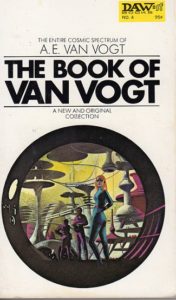Book Review: The Book of Van Vogt by A.E. van Vogt
In 1972, DAW Books was a brand new publishing company started by noted speculative fiction editor Donald A. Wollheim. Its mission statement was to publish quality science fiction books that had not previously appeared in paperback. (As opposed to reprinting old books with a new title, as often happened in the paperback market.) For their fourth publication, Mr. Wollheim reached out to A.E. van Vogt for a collection of old and new stories, trusting to name recognition to sell the book. I mention this because the inside front page is devoted to this information rather than a teaser for the contents.
There are seven stories in this collection, starting with a brand new one, “The Timed Clock.” It’s set at a dinner party, and the host tells the tale of how he became his own grandfather. Is he playing a joke on his guests, or does the clock in the hall have special powers?
“The Confession” is a weird story about a man who can’t quite remember why he doesn’t meet his girlfriend any more, or why he took a menial job sweeping floors when he used to be quite wealthy. And he has visions of a future where things are better, but it’s impossible to see how he got from here to there. Could it have anything to do with the hypnotist whose stage act he participated in? An ambiguous ending. Content note: attempted rape.
“The Rat and the Snake” is set on the homefront during World War Three. Mark Grey loves feeding rats to his pet python, especially hearing their tiny screams. But the availability of rats has dried up due to rat-catchers being drafted and pet stores put on rationing. Mark finds a government research station filled with lab rats, and doesn’t question how easy it is to get inside and steal some. Poetic justice ensues.
“The Barbarian” is a reprint from the 1940s. In the far future, the Linn Empire rules Earth, and has successfully conquered Mars and Venus. But now a new threat arises from Europa, a barbarian horde that looks as though it will sweep aside the decadent empire. Clane Linn, a priest-scientist and acting leader of Linn, is the only hope of dealing with Czinczar. Czinczar is far more intelligent than the title of “barbarian” would imply. Clane is despised by many in the empire (including his late uncle, the former leader) for being a “mutant.” We never learn the extent of his mutation, except that his clothing is designed to conceal the shape of his shoulders. He is, by 21st Century standards, the nicest guy in his government.
“Ersatz Eternal” concerns three men who have crashlanded on an alien world. One of them is insane, but that may make him the best suited to survive in this new environment.
“The Sound of Wild Laughter” concerns Marie Hazzard, a physicist who has been in a loveless (and sexless on her part) marriage with the philandering and maniacally jealous Carl Hazzard for over a decade. She is briefly relieved when Carl dies, only to learn that his brain has been kept alive and able to communicate. The situation winds tighter and tighter, as Dr. Marie must deal not only with her semi-deceased husband, but three greedy men who think they know what really happened.
That story is heavy on the misogyny, most directly from the noxious Carl, but also from the other men trying to manipulate Marie–and she has some internalized misogyny to deal with as well. There’s some dubious consent sex.
And we wrap up with “Lost: Fifty Suns”, reprinted from the 1950s. In the very far future, descendants of humans who fled to the Magellanic Cloud centuries past learn that the government of Earth has now reached their galaxy. While the representatives of Earth claim now to be more inclusive of genetic minorities, they will not stand for there being an independent star nation anywhere in the universe.
The Earth ship issues an ultimatum: Either the civilization of the Magellanic Cloud reveals itself and surrenders, or the Star Cluster will come looking for them with planet-destroying weapons.
This is especially relevant to Captain Maltby, as he is secretly the hereditary ruler of the “Mixed Men”, a new genetic minority that arose from crossbreeding different strains of humanity. Gifted with strange powers, the Mixed Men tried to take over their galaxy’s civilization, only to be beaten back by force of numbers. Some of the Mixed Men think this is a golden opportunity to make a deal with the Earthlings to become local satraps, while many others want to use the ultimatum to pressure their own civilization into giving them back civil rights. Captain Maltby must try to decide what is best for his people, and convince them to accept it.
We also get to see the viewpoint of Lady Laurr, commander of the Earth ship. Her crew has already been on this mission of mapping the Magellanic Cloud for ten years, and was looking forward to going home when they stumbled on evidence of the Magellanic civilization. While their technology is highly advanced, they’re still looking for maybe fifty inhabited star systems out of millions of suns; it could take another decade to locate the Magellanic civilization provided this ultimatum doesn’t flush them out. Lady Laurr faces legal mutiny if she doesn’t get results quickly.
The ending has one side’s efforts and infighting go all for naught. Somewhat surprisingly, this story passes the Bechdel Test.
Of the stories, I liked “The Rat and the Snake” best; to the point with no faffing about. “The Sound of Wild Laughter” goes on too long and has too much misogyny that isn’t challenged for my tastes.
If you like van Vogt’s stuff, this isn’t his most famous work, but is pretty representative. Those who are new to him might want to try Slan or The Voyage of the Space Beagle nstead.

